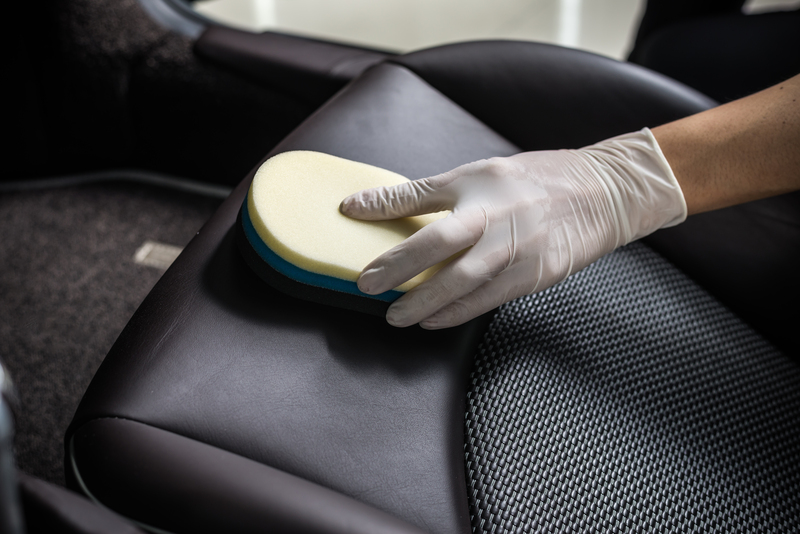Achieve a Fresh Home Environment, Free from Pet Smells
Posted on 16/08/2025
Achieve a Fresh Home Environment, Free from Pet Smells
Pets are wonderful companions, bringing joy and warmth to our homes. However, as much as we love them, they can also be notorious for leaving behind odors that linger. If you have ever wondered how to achieve a fresh home environment free from pet smells, you're not alone. Fortunately, there are effective strategies for eliminating pet odors and keeping your living space inviting and fresh-smelling. In this comprehensive guide, we'll explore actionable tips, expert advice, and solutions for creating a home environment that's both pet-friendly and odor-free.
Understanding the Sources of Pet Odors
Before diving into solutions, it's important to identify what causes pet smells in your home. By understanding the root causes, you can address them more effectively and prevent odors from returning.
- Pet Dander: Microscopic flecks of skin shed by cats, dogs, birds, and other animals.
- Saliva and Body Oils: Pets' saliva and natural body oils transfer onto your furniture, carpets, and bedding.
- Urine and Feces: Accidents, litter boxes, and cages are common sources of strong odors.
- Wet Fur: A pet that gets wet can create a distinctive "wet animal" smell.
- Pet Bedding and Toys: Frequently used pet items can accumulate odors over time.
Recognizing these origin points helps you target your cleaning efforts for optimal pet odor elimination.

Routine Cleaning for a Fresh-Smelling Home
1. Vacuum Regularly to Remove Pet Hair and Dander
Pet hair and dander can embed themselves deep into your carpets, rugs, and upholstery, creating persistent smells. To keep your home fresh, vacuum at least twice a week, focusing on:
- Carpets and rugs
- Furniture upholstery
- Pet bedding
- Hard-to-reach corners and under furniture
Consider using a vacuum with a HEPA filter, which can effectively trap allergens and fine pet particles.
2. Wash Pet Bedding Frequently
Pet bedding is a hotspot for smells. Wash your pet's bed, blankets, and soft toys at least once a week. Use mild, fragrance-free detergents to prevent skin irritations for your furry friends.
3. Clean Hard Surfaces
Don't overlook tile, hardwood, and laminate flooring. Mop floors weekly with a pet-safe cleaning solution to remove dirt and lingering odors. Wipe down walls, baseboards, and doors that pets frequently brush against.
4. Wash Curtains and Fabric Items
Fabric can trap smells just like carpets. Regularly laundering curtains, cushion covers, and throw blankets will help you maintain a fresh home atmosphere free from pet smells.
Eliminating Pet Urine and Strong Odors
1. Promptly Clean Up Accidents
If your pet has an accident, swift action is essential. Blot (don't rub) the area with paper towels, then clean thoroughly using an enzyme-based cleaner. These specialized cleaners break down the proteins in urine and eliminate pet odors at the source (rather than just masking them).
2. Use Natural Deodorizers
Sometimes, you want a fresh scent without harsh chemicals. Try these natural odor fighters:
- Baking Soda: Sprinkle on carpets, wait 15 minutes, then vacuum to absorb odors.
- Vinegar: Mix equal parts vinegar and water in a spray bottle. This solution neutralizes odors and is safe for most surfaces.
- Activated Charcoal: Place bags in rooms or near litter boxes to absorb smells naturally.
3. Deep Clean Carpets and Upholstery
For stubborn smells, rent or purchase a carpet cleaner. Steam cleaning is especially effective for pet odor removal from soft surfaces. For tough upholstery smells, mix a solution of water and gentle detergent, lightly mist on the material, and blot dry. Avoid soaking the fabric, which could promote mold growth.
Maintaining Fresh Air in Your Home
1. Ventilation is Key
Good air circulation does wonders when you want to achieve a fresh home environment free from pet odors. Open windows daily, even for just 10-15 minutes, to disperse indoor odors and introduce fresh air. Use fans or an air purifier to keep the air moving and reduce airborne particles.
2. Air Purifiers for Pet Smells
Modern air purifiers with HEPA and activated carbon filters can capture pet dander, hair, and odors. Place purifiers in areas your pets frequent most for ongoing reduction of airborne smells.
3. Change Air Filters Regularly
If you have central heating or air conditioning, replace filters every 1-2 months during heavy shedding seasons. Dirty filters can recirculate pet smells throughout your home.
Special Attention: Litter Boxes and Pet Toileting Areas
1. Keep Litter Boxes Clean
- Scoop waste daily to prevent ammonia smells from building up.
- Wash the litter box weekly with soap and warm water.
- Replace litter completely at least once a week or as recommended by the manufacturer.
Experiment with clumping, odor-neutralizing, or natural litters to find what best controls smells for your household.
2. Clean Dog Toileting Areas
Use a hose or enzymatic cleaner to clean outdoor potty areas. For puppy pads or indoor dog toilets, replace the pads frequently and clean the area with disinfectant.
Grooming Habits for Odor Reduction
1. Bathe Your Pet Regularly
A clean pet is far less likely to contribute to household odors. Bathe dogs every 4-6 weeks (unless otherwise advised by your veterinarian). For cats, brushing is often more important than bathing, as overbathing can irritate their skin. Always use pet-safe shampoos to avoid allergic reactions.
2. Brush Fur Often
Regular brushing removes loose fur and dander before it settles around the house. Choose brushes designed for your pet's coat type to maximize effectiveness and comfort.
3. Oral Hygiene for Pets
Bad breath is a common source of pet smells that's often overlooked. Brush your pet's teeth or provide dental treats and toys designed to reduce tartar and freshen their breath.
More Ways to Keep Your Home Fresh and Odor-Free
1. Upholstery and Carpet Protectors
Use washable, removable covers on couches, chairs, and beds. Not only do they protect your furniture from stains and smells, but they're also much easier to clean than the items themselves.
2. Incorporate Pet-Free Zones
Consider setting up pet-free areas-such as bedrooms or home offices-where pets aren't allowed. This strategy ensures you always have at least one completely odor-free space to retreat to.
3. Calming Scents and Home Fragrance
Refresh your home further with safe fragrance options:
- Essential oil diffusers (ensure oils are pet-safe; some can be toxic!)
- Scented sachets or potpourri out of reach of pets
- Homemade simmer pots with herbs, citrus, and spices
These additions create a welcoming aroma that complements your efforts in removing pet odors.
Dealing With Persistent Pet Odors
1. Address Mold and Mildew
Sometimes, chronic smells may be due to mold growth, especially if your pet has a favorite napping spot in a damp area. Check for leaks or condensation, and use a dehumidifier if needed.
2. Replace Irredeemable Items
If an item (such as a rug, cushion, or mat) holds stubborn smells even after deep cleaning, it may be time to replace it. This one-time sacrifice will make a big difference when trying to achieve a completely fresh home environment.
3. Consult a Professional Cleaner
When all else fails, professional cleaning services specializing in pet odor removal can treat your carpets, upholstery, and mattresses using commercial-grade products and equipment.
Pet Training and Prevention: The Long-Term Solution
1. House Training
Prevention is key. Consistent house training for puppies, dogs, and even young cats minimizes the chances of future accidents and lingering odors. Use positive reinforcement, frequent potty breaks, and clear routines.
2. Encourage Litter Box Use
- Keep litter boxes clean and accessible.
- For multi-cat households, provide one box per cat plus one extra.
- Try different types of litter until you find what your cat prefers.
3. Address Medical Issues Promptly
Persistent accidents or strong body odors could indicate health concerns, such as urinary tract infections, dental disease, or skin issues. Always consult your veterinarian if you notice unusual smells or changes in your pet's toileting habits.

Summary: Your Pet-Friendly, Fresh-Smelling Home Awaits!
Achieving a fresh home environment free from pet smells is completely possible, no matter how many furry companions you have. Through a combination of routine cleaning, targeted odor elimination, proper ventilation, regular grooming, and preventive training, you can maintain a welcoming and pleasant atmosphere for everyone.
Remember: Consistency is key! By building odor-reduction strategies into your everyday routine, you'll find that your home smells as lovely as it feels-all while enjoying the companionship of your beloved pets.
Frequently Asked Questions: Achieving Odor-Free Pet Homes
- What is the best way to remove pet odors from carpets?
Enzymatic cleaners and regular deep cleaning are the most effective ways to break down odor-causing compounds in carpet fibers. - How can I stop my house from smelling like cat litter?
Daily scooping, complete litter changes, washing boxes weekly, and using air purifiers nearby significantly reduce litter box smells. - Are air fresheners safe for pets?
Some air fresheners contain chemicals or essential oils that can be harmful to pets. Always read labels and use only products labeled as pet-safe. - Can I use vinegar to eliminate pet smells?
Yes, diluted vinegar is an effective and natural deodorizer for many surfaces-just test fabrics in an inconspicuous spot first.
Embrace these expert-recommended steps and enjoy a truly fresh home, blissfully free from pet odors!



.png)